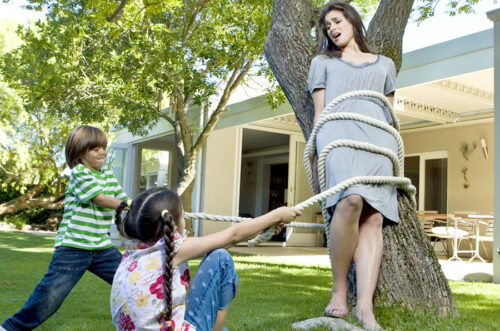Parenting Is Saying No
Sub-optimal Parenting
Your Children Will Always Hate You For Something
Parenting Means Creatively Saying “No”
by Gregory A. Barrett, M.D.
Many years ago, back when I was a half-dead Pediatric Resident dozing through yet another interminable Morning Report at the hospital where I trained, I heard the lecturer of the day make the statement which is the title of this essay. Rousing myself slightly, I wondered what on earth she was trying to say. Hate me? Why, that would never happen! Would it? I mean, I had a great relationship with my kids, and if I did say so myself (as I frequently did back then) I’d been doing a pretty darned good job at this parenting thing thus far. Nah, no way, they would never hate me. Ridiculous! Now, my children were young at the time, which may partially have explained my naivete. This was in those years of innocence prior to the slamming of doors, grounding, refusal to purchase a video game player, removing privileges, and “Well, you might as well stop complaining about it, Rachel, because you ARE going to Church Camp this summer, and that is final!” Indeed, it wasn’t very long after first hearing the speaker’s prophecy that I began to appreciate her wisdom.
Saying No Means You’re The Parent

Quite often these days I see parents who seem to want to be their child’s friend, and adopting this role renders you overly sensitive and vulnerable. Children need other children to be their friends and their parents to be their parents. Your job is not to be a playmate. It is to establish an acceptable code of conduct, show them the difference between right and wrong, set limits, supply a safe and loving environment, and be a good role model. Now, that’s a heavy load, and I’ve got to think it would be extremely difficult to accomplish all of the above and be their buddy, too. Truth be told, it is downright impossible, and if you try to do so you will often find yourself in contradictory and mutually exclusive positions. That is not to say that moms and dads shouldn’t be doing fun things with their children. Of course, they should, that’s the best part of being a family! But always remember, your first responsibility is to be their parent. So, if – or rather, I should say, when – they get mad and say nasty things to you, well, that’s just too bad.
As children grow older, they become quite skilled at trying to drive a wedge between their parents for personal gain. It is absolutely essential for both the mother and the father be on the same page. Please note: this does not happen by accident. Limits and consequences must be discussed thoroughly, considered carefully, and agreed upon in advance. If a given unacceptable act occurs the response must be consistent, no matter which of the parents is present. That’s why it is vitally important, whenever a major situation arises and there is a divergence of opinion regarding the appropriate response, for parents to retreat behind closed doors, hash it out in private, and arrive at a compromise agreement. Then and only then publicly confront your child with the likely unpopular pronouncement. And when confronted with something which hasn’t come up for discussion previously, stall. Yep, figure out how to put them off until you have time to talk to it over with your partner. But always, ALWAYS, present yourselves as a unified front.
Saying No Takes Thick Skin

It is human nature for people to look back on their childhood as something of a struggle, which only through strong will and fortitude they somehow miraculously survived. And this is apparently true no matter how vanilla the upbringing. In order to cement this image in their minds someone has to play the role of the villain, and more often than not it is the mother and the father who are elected. Because, like it or not, you have a role to play in this drama. No matter how good a job you think you’re doing, it won’t be good enough. Even if you were perfect, it still wouldn’t be good enough. Your children will simply have to invent something. And if your son or daughter should bring up a rather tainted, false memory of some distant past event, all you can do is just sit back and smile. Because it’s going to be their version, and nothing you could say will ever change their recollection.
Many attributes are necessary for mothers and fathers, but having a thick skin and deaf ears ranks high on the list of desirables. You need to be bullet-proof, able to laugh off the slings and arrows and outrageous comments made to you by your children. This typically begins shortly after the first words come out of their mouths and will continue right through adolescence. Try to handle it with humor and patience, always being able to fall back on the confident knowledge that no matter what they say or do the reality is they love you and always will. Although it may seem far from it at the time….
No—Parents Most Important Vocabulary Word

I believe “No” is the single most important word in a parent’s vocabulary. Your children desperately need you to set limits for them. It is one of your most important jobs, and it becomes infinitely more difficult if you are overly concerned with being liked or being their friend. So when the time comes to be tough – and it will – you must learn to say to yourself, Damn the consequences, and full speed ahead. It won’t make your son or daughter happy, but they’ll get over it. And so will you. Remember, you’re in this for the long haul.
Parenting is not a popularity contest.
☤


